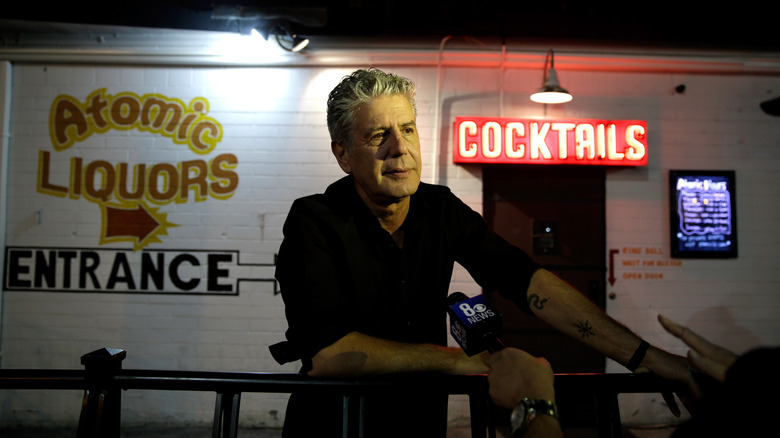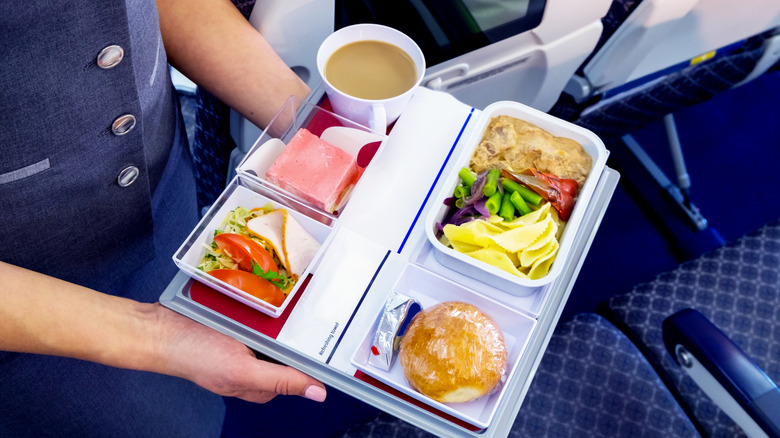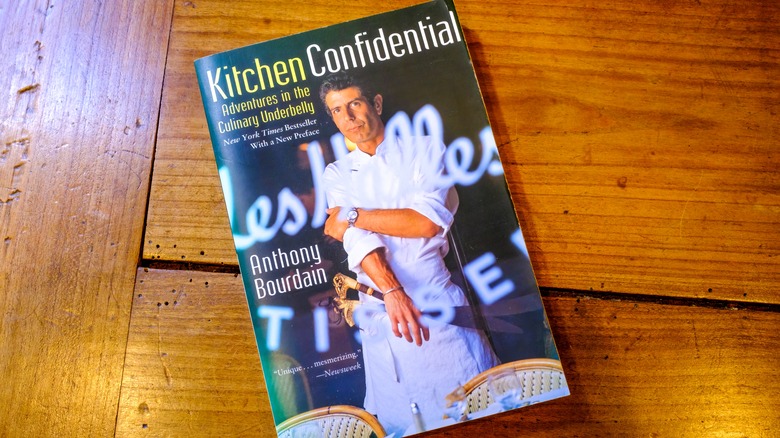Why Anthony Bourdain Avoided Eating Airplane Food (And Why You Should Too)
A still-beating cobra heart, maggot fried rice, fermented shark — the late Anthony Bourdain has tried it all. Renowned for his culinary expertise and adventurous palate, the chef, author, and travel documentarian was willing to try anything and risk anything in search of unique and authentic gastronomic experiences. However, there is one thing that Anthony Bourdain would not touch with a 10-foot pole (or fork): airplane food.
This is somewhat surprising for a frequent traveler like Bourdain, who, especially during the filming of his shows such as "No Reservations" and "Parts Unknown," would be gone for nearly 250 days a year for the past decade. All those overnight, dreadfully long flights and not a single meal? "Never." For the $3.9 billion airline food-service industry (in the U.S. alone!), this is not a palatable review. In a 2016 interview with Bon Appétit, Bourdain candidly expressed his disdain for airplane food, stating, "No one has ever felt better after eating plane food."
There is a grain of truth to that. Airplane food is known to be loaded with preservatives and salt because, at higher altitudes, people lose about 30% or more of their taste for salt, according to a 2010 study conducted by Germany's Fraunhofer Institute for Building Physics (via BBC Future). This is partly why many feel bloated, heavy, or unwell after a flight. The change in atmospheric pressure is also a contributing factor to "jet belly" — in the same way, your ears pop, something similar happens within your digestive system. Avoiding airplane food, as Bourdain would, may help alleviate some of these unpleasant symptoms.
Food on the fly: Bourdain's approach
Anthony Bourdain believed that people often consumed airplane food out of sheer boredom rather than genuine appetite. Indeed, it can sometimes help make what feels like a never-ending flight a little more interesting. Bourdain's preference was to arrive at his destination with an empty stomach, likely anticipating the local culinary delights that awaited him. Needless to say, the unappetizing grub often served on flights was best left untouched.
While avoiding plane food may not be feasible on lengthy flights, Bourdain was selective about his in-flight meals, as he explained to Travel + Leisure (via Insider). For extended journeys, such as a 19-hour long haul from New York City to Singapore, he would opt for specific items like cheese and a generous amount of port. This choice allowed him to satisfy his hunger while still preserving his appetite for the culinary adventures that lay ahead — and perhaps get a little buzz. More often than not, though, Bourdain would sleep when the flight attendants came around with the food carts.
As tempting as it may be to bring your own food on a flight to avoid unappetizing airplane meals, Bourdain offered a word of caution. Speaking to Bon Appétit in 2016, he humorously warned that carrying a strong-smelling or disruptive meal might result in becoming the "most despised person in the cabin." Jumping on a plane with saucy ribs or a smelly brown bag full of fries and a burger to boot is probably not the greatest idea (for you, delicious — but for others, not so much).
Better alternatives for a sky-high meal
If not eating on your flight is not an option (for medical reasons, if maybe the journey is extremely long, or perhaps you get "hangry"), and you must have airplane food — choose wisely from your airline's meal selections. To avoid jet belly or an unpleasant meal, remember that less is more. Research the available options before your flight and opt for meals that align with your preferences — and save some room for local food after touchdown.
For budget-conscious travelers or those with dietary restrictions, packing your own snacks can be a far more practical and satisfying choice. Consider bringing easily digestible and healthy foods, such as yogurt, salads, fruits, sandwiches, or wholesome wraps that will keep hunger at bay without causing any discomfort to fellow travelers or your stomach. These types of snacks will support your digestive system amid atmospheric pressure changes and provide a more manageable meal alternative than airplane food. Another piece of advice — don't board a flight with a full stomach. A big meal before a flight is like going scuba diving after an all-you-can-eat buffet.
While Anthony Bourdain was famously critical of airplane food, his culinary wisdom extends beyond the skies. By adopting a thoughtful approach to in-flight meals, you can make your travel adventures as delicious as the culinary wonders that Anthony Bourdain so passionately explored during his life. Maybe give port wine and cheese a try on your next flight, or just pretend to sleep when dinnertime rolls around at 36,000 feet.


